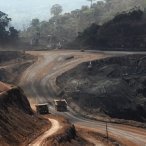English · Español

27 June 2013 | Interviews | Human rights | Extractive industries
The Resistance against Mining Industry Goes Forward
Creation of the Brazilian Committee for the Defense of Territories against the Mining Industry, made up by dozens of organizations and movements.
Download: MP3 (1.4 Mb)
Interview with Brazilian researcher and activist Carlos Bittencourt.
These last weeks, Brazil has witnessed massive protests in which people are making different claims. What started as a series of demands related to public transportation has gone beyond and right now is disputed by left-wing and right-wing parties. Before the urban protests took place, some of the movements and organizations that have historically fought for land rights in the country took an important step in their popular claims: they created the Committee for the Defense of Territories against the Mining Industry.
This Committee was created in a critical moment regarding the mining industry in Brazil. Last 18th of June, President Dilma Roussef sent to Parliament the text with the proposal for a new code on mining, an issue that has been discussed about for many years, as Carlos Bittencourt explains in a telephone interview with Real World Radio. He is a mining researcher at the Brazilian Institute of Social and Economic Analyses (Ibase).
Firstly, Bittencourt stressed the fact that the civil society did not have access to the text of the new code until it was sent to Parliament (it was treated as a “secret” project). According to Bittencourt, the Government officially presented it as “code on production that was not created to impose limits to the expansion process of the mining industry in Brazil, but rather the contrary, as its objective is to promote mining expansion even further.”
With this general overview, last 29th of May some 50 social organizations from all over the country, formed by environmentalists, peasant movements, communities affected by the mining industry, NGOs and academics, launched a platform of resistance against the mining industry.
How does the mining industry affect Brazil and to what extent?
When asked about the different impacts that big mining companies cause and have historically caused in Brazil, Bittencourt classifies three types of impacts: environmental, economic and in the social community.
Regarding the first of the impacts, he explained that the main problems identified are the pollution of water springs and deforestation. As for the impact on communities, he underlined the disparity between the size of mining projects and the municipalities that receive them. This means the population has to organize itself completely towards mining, and no chances are given to other activities such as peasant agriculture. In other cases, communities are directly displaced, a fact that is especially serious for indigenous communities, since that means a step back in law. In fact, a law that forbids mining activities in indigenous territories is to be modified.
Finally, on the economic front, it has been underlined that the importance that the mining industry (especially iron) has achieved in Brazil these last years in terms of exports is causing the economy of the country to go back to a primary-sector state. This fact makes the country vulnerable to volatilities in international ore prices.







